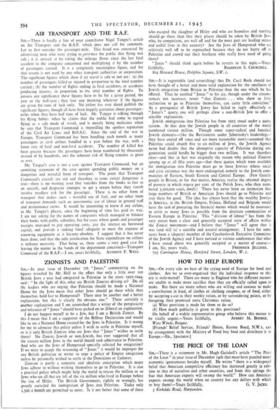AIR TRANSPORT AND THE R.A.F.
Stit,—There is hardly a line of your contributor Nigel Tangye's article on Air Transport and the R.A.F. which does not call for comment. Let us first consider the passenger-mile. This fraud was concocted by advertising men who were trying to.convince the public that flying was safe ; it is arrived at by taking the mileage flown since the last fatal accident to the company concerned and multiplying it by the number of passengers carried. It is a completely meaningless figure, and for that reason is not used by any other transport authorities or corporation. The significant figures which show if air travel is safe or not are : (a) the number of passengers killed or injured in proportion to the total number carried ; (b) the number of flights ending in fatal accidents, or accidents producing injuries, in proportion to the total number of flights. To possess any significance these figures have to be for a given period, the year or the half-year ; they lose any meaning whatever if the figures are given for runs of luck only. No airline has ever dared publish the significant figures, though all have been happily garrulous about passenger- miles when they have had runs of luck. Mr. Tangye is talking through his flying helmet when he claims that the public had come to regard flying as a safe mode of travel, and is merely being malicious when he says that Transport Command is imperilling the spotless reputation of the Civil Air Lines and B.O.A.C. Since the end of the war in Europe, Transport Command has been handling each month as many passengers as civil airlines handled in a year before the war, with a lower rate of fatal and non-fatal accidents. The number of killed has been greater because the passengers have been numbered by thousands instead of by hundreds, and the inherent risk of flying remains as great as ever.
Mr. Tangye's case is not a case against Transport Command, but an unwitting statement of the case against spending public money on a dangerous and wasteful form of transport. The point that Transport Command's aircraft are old and therefore to some extent dangerous is true—there is no wasting asset that vanishes from the books as fast as an aircraft, and desperate attempts to get a return before they vanish involve needless risk for the passenger. There is no other form of transport that makes such wasteful use of fuel, and no other form of transport demands such an uneconomic use of labour in ground staff and maintenance crews. It would be interesting to know if any airline, in Mr. Tangye's phrase, since the beginning of time has paid its way. I am not asking for the names of companies which managed to balance their books with public subsidies, but for cases where goods and passenger receipts managed to pay operating costs, pay the interest on borrowed capital, and provide a sinking fund adequate to meet the expense of renewing equipment as it became obsolete. I suggest that it has never been done, and that the only justification for State expenditure on airlines is military necessity. That being so, there seems a very good case for leaving the matter in the hands of the department concerned—Transport Command of the R.A.F.—I am, yours faithfully, ANTHONY F. WEST.






























 Previous page
Previous page